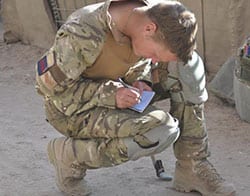Open City Docs Fest: After War
By ucyow3c, on 4 July 2014
The centenary of World War One and the withdrawal from Afghanistan have inspired multiple events exploring the dilemmas of returning soldiers, but few have delivered the combination of raw emotional punch and intellectual rigour that was on display at the After War panel at the Open City Docs Fest on 22 June.
 Jake Wood, who was diagnosed with post-traumatic stress disorder (PTSD) after serving as an Army reservist in Afghanistan, showed dramatic footage from his helmet-camera that brought home the chaotic reality of combat.
Jake Wood, who was diagnosed with post-traumatic stress disorder (PTSD) after serving as an Army reservist in Afghanistan, showed dramatic footage from his helmet-camera that brought home the chaotic reality of combat.
He spoke movingly about the sense of dislocation he felt on returning to his job in a City investment bank, a theme echoed by Kevin Weaver, a war photographer who has battled the symptoms of PTSD since being shot and wounded while covering the war in Bosnia.
Weaver showed a picture of one his artworks that evoked the torment of sleeplessness and nightmares: a four-poster bed adorned with hangman’s nooses.
While their testimony provided a glimpse into the way PTSD can reshape the mental landscape of trauma survivors, academics on the panel explained how our understanding has evolved since Charles Myers, a Cambridge psychologist, wrote an article in the Lancet in 1915 describing the phenomenon of “shell shock” among troops in France.
Historian Ben Shephard, whose book A War Of Nerves documents the evolution of military psychiatry, explained how the diagnosis of PTSD was adopted in the US in 1980 as a result of intense lobbying by a group of American psychiatrists who were opposed to the war in Vietnam and whose views were shaped by treating survivors of the Holocaust.
Controversy lingers over the extent to which a framework for treating trauma that grew out of a unique chapter in American history might be universally applicable.
UCL psychologist, Professor Chris Brewin, one of Britain’s leading experts on PTSD, argued that there is growing evidence that people around the world suffer the effects of trauma in similar ways. He examines the debate around various aspects of PTSD in his book Posttraumatic-Stress: Malady or Myth?
The discussion was deftly chaired by Stuart Hughes, a BBC News Senior World Affairs Producer, who lost part of his right leg in a landmine explosion in Iraq in 2003 and was later treated for PTSD.
Voices from the front-line in Afghanistan provided a haunting reminder of the sheer range of emotions that combat can evoke. Panel participant Derek Eland was embedded as an official combat artist with the British Army in Helmand in 2011.
He asked soldiers to write down their feelings on postcards. Some used scraps of ration packs. Sparse prose describing the thrill of combat, grief at losing comrades and longing for loved ones opens a rare window into the private worlds of men at war.
—
Matthew Green is an author and journalist who covered conflicts in Afghanistan and Iraq. His new book documenting the struggles of British soldiers with PTSD is due to be published next year by Portobello Books.
 Close
Close

